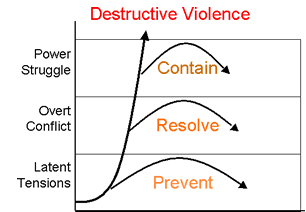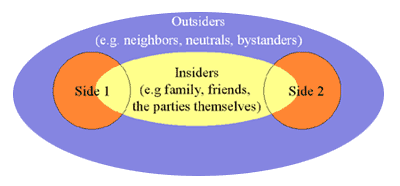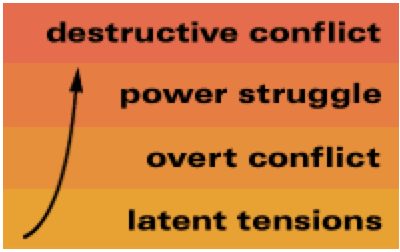Teach about the Third Side
Among all the Thirdsider roles, none may be more important than that of Teacher. The Teacher plays the key role in the construction of a culture of peace, one in which even our most serious disputes are handled not on the basis of force and coercion but of mutual interest and coexistence.
Curriculums for Teaching at High Schools and Universities
If you are interested in teaching about the Third Side to high school or university students, here is an outline of a possible curriculum that can be used:
- MODULE 1 – WHAT DO YOU THINK (AND WHY)?
- Lesson 1: Their beliefs unbridled
- MODULE 2 – HUMANITY’S GREATEST CHALLENGE
- Lesson 2: The Human Dilemma
- Lesson 3: The Nature of Conflict–A Different Approach
- MODULE 3 – THE CYCLE OF HUMAN HISTORY
- Lesson 4: A Coexistence View of History
- Lesson 5: A Coercive Perspective
- Lesson 6: Signs of a Coexistence Future?
- MODULE 4–WHAT YOU CAN DO
- Lesson 7: The Third Side in Action (Part 1): Prevention Roles
- Lesson 8: The Third Side in Action (Part 2): Resolution Roles
- Lesson 9: The Third Side in Action (Part 3): Containing Roles
- Lesson 10: The Sum of the Parts Equal the Whole
- Lesson 11: Where from here?
Foundational Materials
- Third Side Presentation: The following PowerPoint presentation is a high level overview of what the Third Side is. See the Presentation on the Third Side
- A One Day Training – The Third Side Workshop: Refer to the materials that go along with our Third Side Workshop. See the Facilitator’s Guidebook and the Participant’s Guidebook.
- Third Side Stories and Case Studies: Stories and case studies are also available for you to use in your classroom to support your curriculum. Go to Third Side Stories and Case Studies >>
Specific Exercises
- 3S Perspective Taking: Part of the challenge of being a thirdsider is being able to see different perspectives of a situation. This exercise helps people to see and ultimately understand the power of taking different perspectives. See the 3S Perspective Taking Exercise
- 3S Responding: This exercise gives people an opportunity to practice responding as a thirdsider. They will gain the confidence to take some action when they see a situation evolving in front of them. Possible courses of action will vary tremendously. See the Responding Exercise
- 3S Triggers: Knowing how to manage our emotions productively is a large part of dealing with conflict and in taking the Third Side. This exercise is designed to help people have their emotions rather than be their emotions. See the 3S Triggers Exercise
- 3S Constructive Conflict: This exercise is designed to let people tell others about their experiences in resolving conflict constructively. By sharing a personal story about how they helped deal with a conflict constructively they are also explaining how they have acted as thirdsiders without even knowing it. See the 3S Constructive Conflict Exercise
- 3S Listening: The purpose of this exercise is to show how hard it is to really listen and the impossibility of listening to two conversations simultaneously. See the 3S Listening Exercise
- 3S Staging a Conflict: This exercise is designed to introduce conflict and to elicit a visceral reaction from the participants toward a simulated conflict. This will increase participants. self-awareness about their own relationships to conflict. See the 3S Staging a Conflict Exercise
- Large Group Exercise: This large-group exercise has been used in many of the thirdside trainings. The main purpose of this exercise is to demonstrate how thirdsiders can use the power of questioning to help the parties re-think a situation from a thirdside perspective that incorporates all the interests involved. The exercise gives participants the experience of being a thirdsider in a given conflict situation. See the Large Group Exercise
- 3S Roles: The 3S Roles exercise focuses on understanding which roles are most suitable for a certain person; it gives participants a better general understanding of the roles. See the 3S Roles Exercise
- The Third Side Conflict Resolution Activity: Craig Angus from the Dawson School created a “Third Side Activity” for his high school students. The Third Side Conflict Resolution Activity is a an opportunity for students to learn and practice a wide variety of skills and abilities including public speaking, debate, listening, thinking on your feet, note taking, working in groups, questioning and reflecting. The focus of the activity is on the conflict between Palestine and Israel. See the Third Side Activity
- Simulation: There is a Third Side simulation created by Joshua N. Weiss, Brian Blancke, and Chang In Shin. It was also published in the book Must We Fight?. See the Sanford High Simulation
Further Resources
- Comments and Suggestions: Your comments and suggestions about any of the teaching materials are most welcome. Please email us at info@thirdside.org.
- Exercises Needed: We also are always looking for exercises and simulations for helping people of all ages learn to exercise the power of the Third Side. Please email us at info@thirdside.org.




